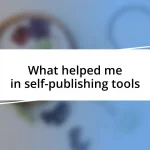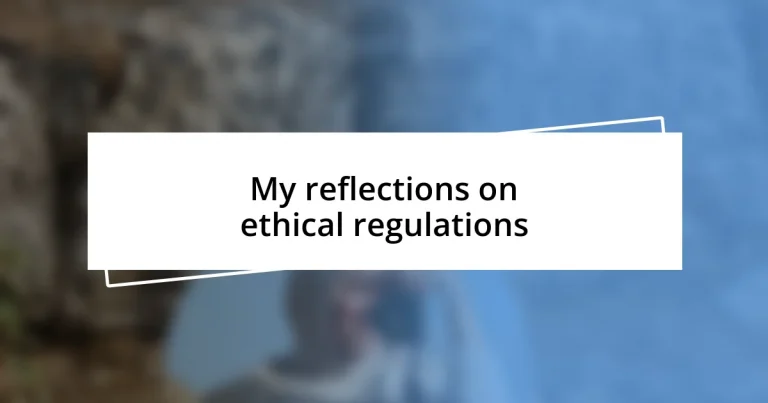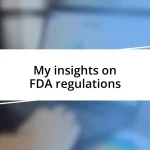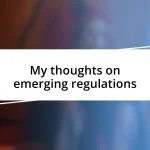Key takeaways:
- Ethical regulations serve as vital frameworks for decision-making, promoting values like integrity, accountability, and transparency in professional settings.
- Key principles of ethical guidelines enhance trust, guide behavior, and foster a collaborative culture within organizations.
- Future trends in ethics emphasize sustainability, the use of AI technology for compliance, and increasing transparency to create a more responsible and accountable workplace environment.
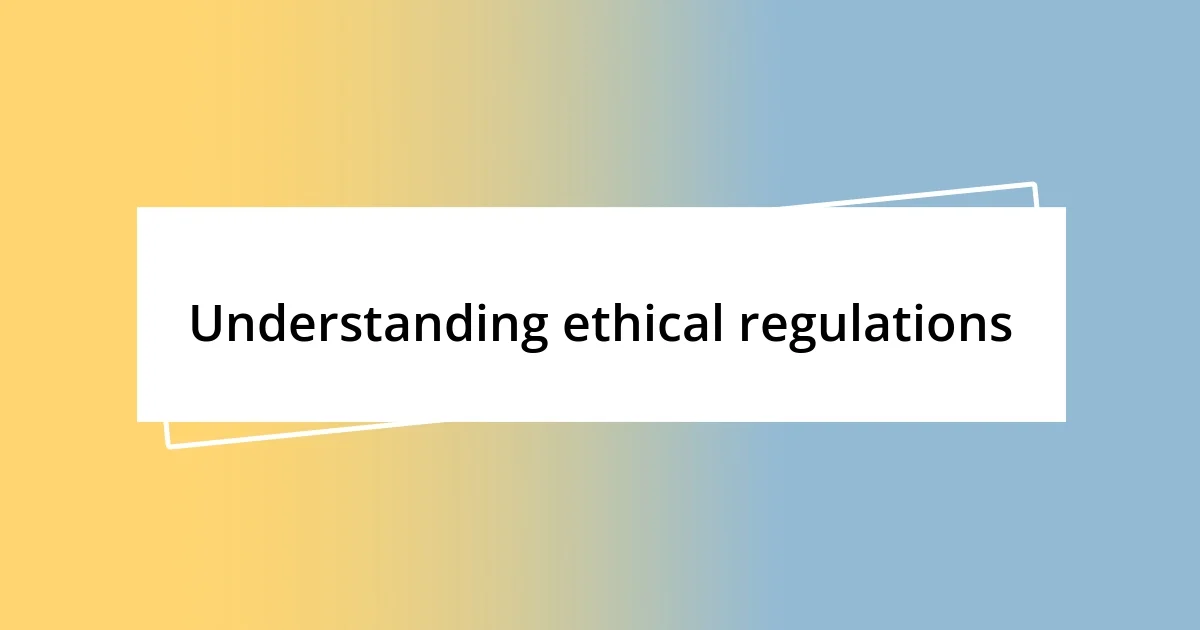
Understanding ethical regulations
Ethical regulations serve as guiding principles that help navigate the complex landscape of human behavior, especially in professional settings. I remember my first experience in a workplace where ethical compliance was taken seriously. It was eye-opening to see how decisions were made with integrity as the bedrock, sparking a deeper appreciation for the balance between personal values and organizational expectations.
When I think about ethical regulations, I often reflect on their role in protecting the interests of both individuals and society. Have you ever found yourself in a situation where you had to choose between what’s right and what’s easy? I know I have, and those moments truly test our character. This is where ethical regulations step in, providing a framework that encourages us to make choices aligned with ethical standards, even when it’s challenging.
Understanding ethical regulations requires us to acknowledge the responsibilities we hold toward one another. I once encountered a dilemma regarding transparency and honesty in communications. It was a tense moment that highlighted how critical it is for organizations to foster a culture that not only upholds ethical standards but also empowers employees to voice concerns. Isn’t it reassuring to know that we can rely on these regulations to guide us toward ethical conduct?
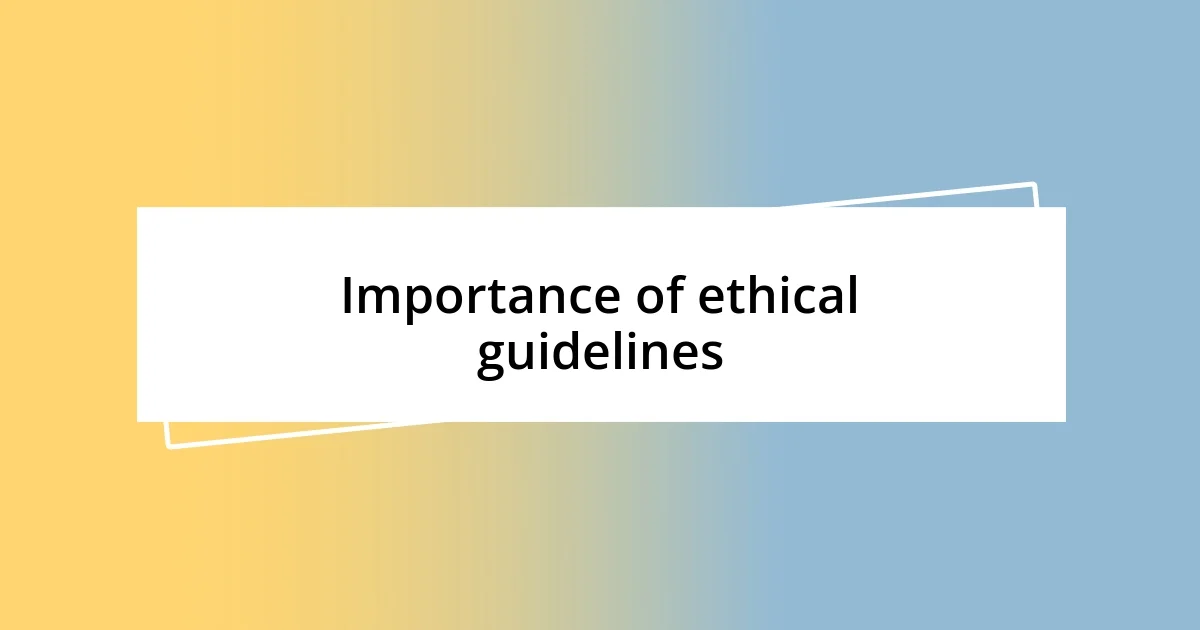
Importance of ethical guidelines
Ethical guidelines are vital because they create a foundation of trust within organizations and the broader community. In my early career, I witnessed how adherence to ethical standards encouraged open dialogue, fostering an environment where ideas could freely flow. It was refreshing to see colleagues collaborating and taking risks creatively, all while having clear ethical boundaries to lean on.
Here are some key reasons why ethical guidelines matter:
- Build Trust: They establish trust among employees, clients, and stakeholders, reinforcing a sense of security.
- Guide Decision-Making: Ethical guidelines provide a clear decision-making framework, helping individuals navigate complex situations.
- Enhance Reputation: Organizations known for strong ethical practices often enjoy enhanced reputations, leading to increased customer loyalty.
- Promote Accountability: These guidelines hold individuals and organizations accountable for their actions, ensuring that ethical lapses are addressed.
- Encourage Respect: They promote a culture of respect for diverse perspectives and values, contributing to a healthier workplace atmosphere.
Reflecting on a tough situation I faced, I remember a project where the pressure to deliver results clouded some people’s judgment. It became evident that having ethical guidelines could prevent such a scenario by reinforcing our collective commitment to integrity. The lessons learned from that experience still resonate with me, making it clear that ethics aren’t just rules; they are essential for fostering responsible growth and innovation.
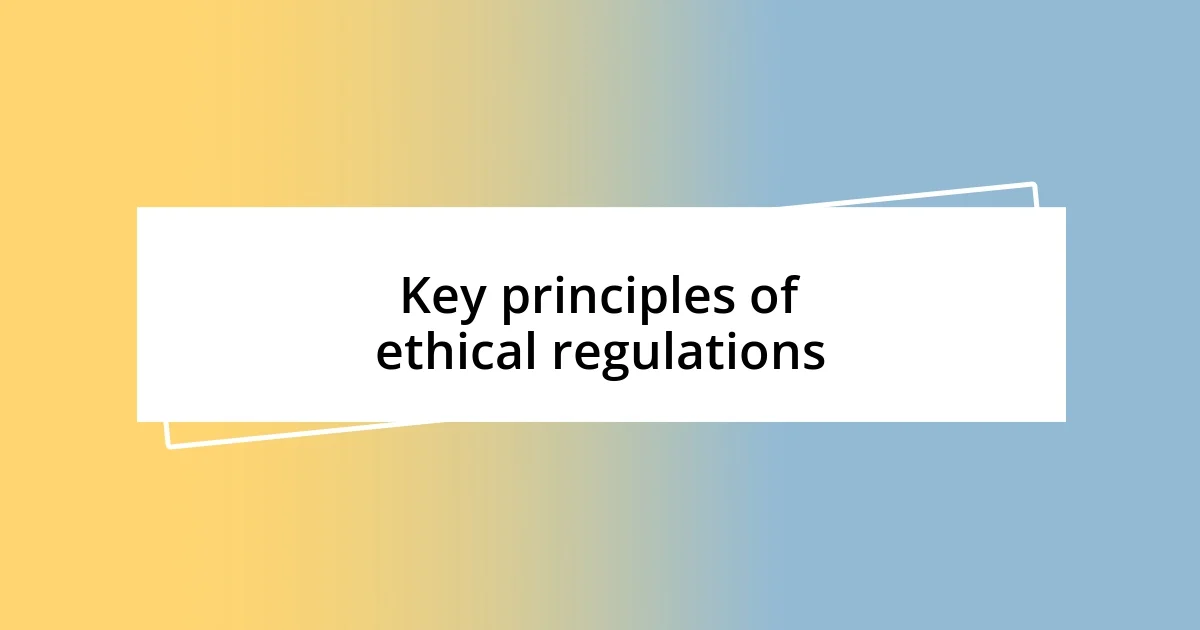
Key principles of ethical regulations
Key principles of ethical regulations focus on integrity, accountability, and transparency. I’ll never forget a time I faced a project with conflicting interests. It was during this experience that I recognized the need for integrity—not just as a buzzword, but as a core principle that shapes actions and decisions, even when no one is watching.
Another crucial aspect is accountability. When I worked with a team that had a clear framework for addressing ethical breaches, I saw firsthand how this created a sense of ownership among all members. Everyone knew that their actions could be held up for scrutiny, which inspired a commitment that made us all strive for our best selves.
Lastly, transparency fosters trust, and I realized just how significant that was during a challenging merger process. Open communication helped ease fears and doubts, turning a potentially chaotic situation into a collaborative effort. It proved to me that ethical regulations aren’t just guidelines; they serve as a vital compass that steer us toward healthier and more effective interactions.
| Key Principle | Description |
|---|---|
| Integrity | The commitment to act honestly and adhere to moral principles, even in challenging situations. |
| Accountability | Taking responsibility for one’s actions and their consequences, ensuring ethical breaches are addressed. |
| Transparency | Open communication that builds trust and helps maintain a collaborative environment. |
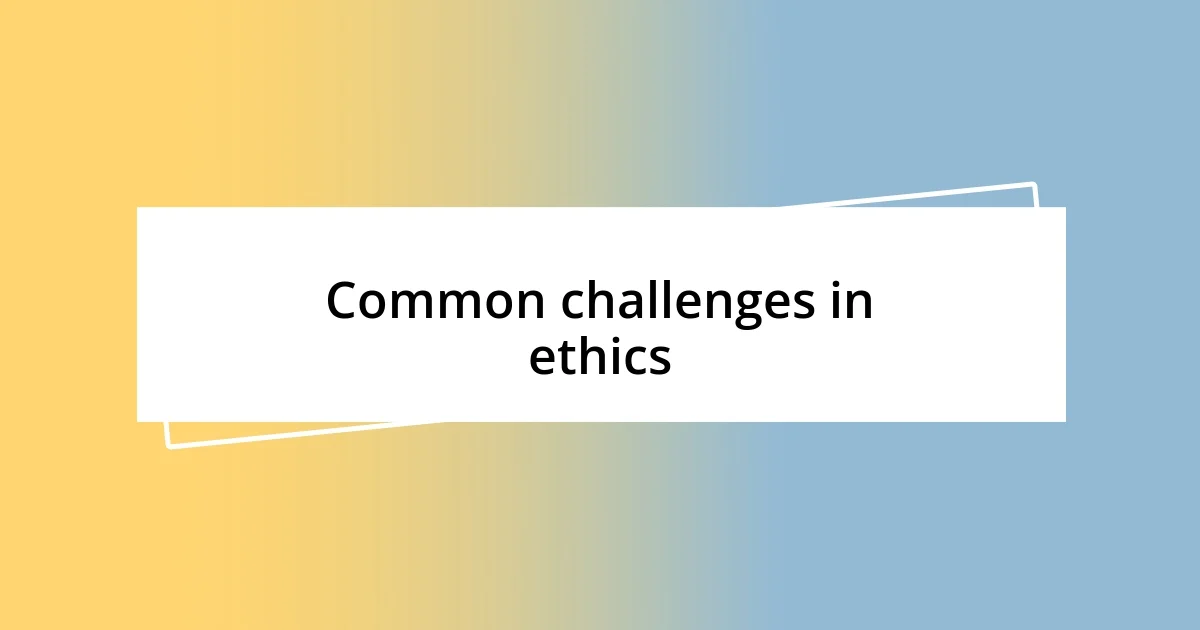
Common challenges in ethics
One common challenge in ethics is the conflict between personal values and organizational demands. I remember a scenario where I felt pressured to prioritize profits over ethical considerations. It left me questioning not just my role in the organization, but my own integrity. How do we reconcile our personal ethics when they clash with the expectations of our workplace? This struggle can create significant stress and disillusionment, leading to a decision-making paralysis that stifles both individual and organizational growth.
Another hurdle I’ve encountered is the ambiguity of ethical guidelines. I once dealt with a situation where the guidelines were so vague that they left room for interpretation. This ambiguity led to differing opinions among team members, creating friction and confusion. I often wonder, how can we expect to uphold high ethical standards when the very guidelines we rely on are open to interpretation? Clear and specific ethical regulations are crucial in minimizing misunderstandings and ensuring that everyone is on the same page.
Furthermore, the challenge of accountability often emerges, especially in large organizations. There was a time when I witnessed a colleague sidestep accountability after a significant mistake. It was disheartening to see how a lack of consequences for unethical behavior can foster an environment where standards slip. It begs the question: what does it say about an organization when its members don’t feel responsible for their actions? Holding individuals accountable not only reinforces the importance of ethics, but it also strengthens the collective commitment to doing the right thing.
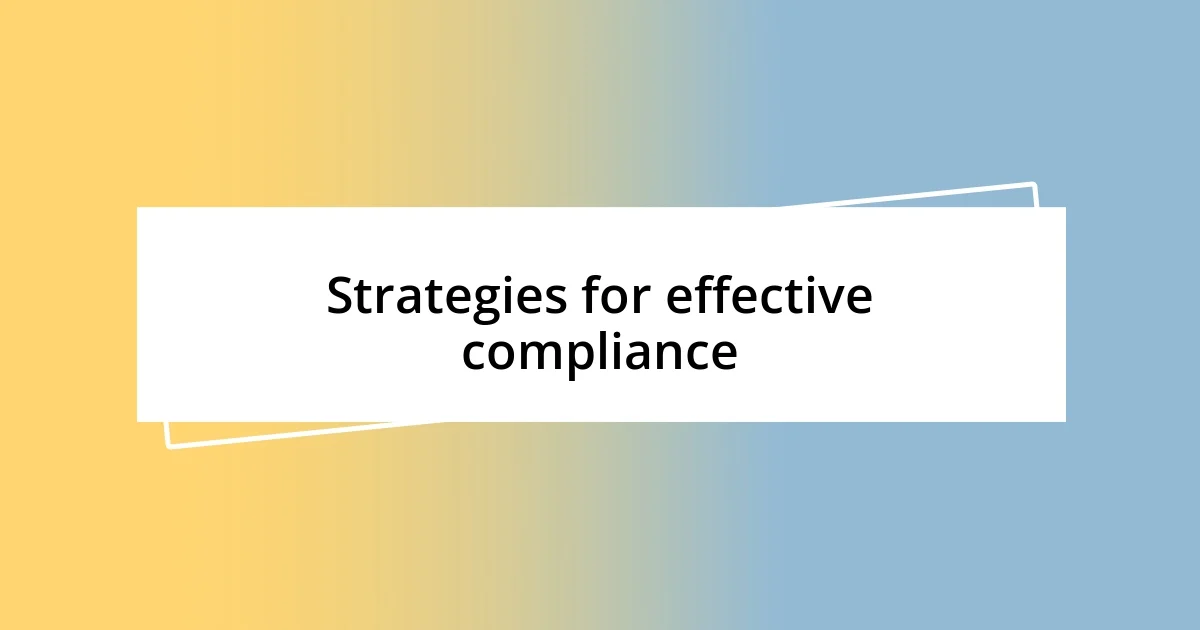
Strategies for effective compliance
When it comes to effective compliance, establishing a robust training program is essential. I’ve seen organizations thrive when they invest time in teaching employees about ethical standards clearly and engagingly. It’s fascinating how regular workshops or interactive sessions can transform knowledge into practice. Have you ever participated in a training that truly resonated with you? I remember one such session where we discussed real-life scenarios. It not only deepened my understanding but also made compliance feel more tangible and relatable.
Another valuable strategy is to foster an open culture where employees feel comfortable reporting concerns. I had the opportunity to work in a team where we implemented an anonymous feedback system. It created a safe space for voices to be heard—the impact was profound. Suddenly, issues that once lurked in the shadows came to light, prompting discussions that drove real change. How does your workplace handle ethical concerns? The answer to that question can reveal a lot about the overall commitment to compliance.
Lastly, leveraging technology can significantly enhance compliance efforts. In my experience, using compliance management systems made it easier to track policies and maintain transparency. I recall a time when my team adopted such a tool, and it drastically reduced compliance-related errors. It was a game-changer. Technology can streamline processes and provide invaluable data for ongoing assessments. So, why not embrace these tools to ensure we’re not just meeting, but exceeding ethical standards?

Case studies in ethical practices
One notable case study that stands out in ethical practices is the approach taken by a well-known technology company towards data privacy. I remember attending a seminar on this topic, where the speaker shared how the organization transparently communicated its data collection practices to users. This not only fostered trust but also encouraged user engagement. How often do we see companies genuinely taking the time to educate their customers? It made me realize the power of transparency in building lasting relationships.
In another instance, I witnessed an intriguing ethical dilemma unfold at a marketing firm. A colleague discovered a competitor’s ad campaign that had lifted content directly from our materials. Rather than retaliate, we chose to address the issue diplomatically. It sparked a fascinating conversation about professional integrity and the long-term benefits of ethical conduct. Isn’t it interesting how opting for honesty often opens doors for collaboration instead of conflict? This experience reaffirmed my belief that ethical practices should always take precedence, particularly in competitive environments.
A final example that resonates with me is the healthcare sector’s commitment to informed consent. I recall a moment when I accompanied a family member to a medical appointment, and we were presented with clear, comprehensive information about treatment options. It was reassuring to witness the staff emphasize patient autonomy and the importance of understanding one’s choices. How crucial is it to feel empowered in healthcare decisions? This case highlighted for me how ethical practices can directly impact individuals’ well-being and trust in essential systems.
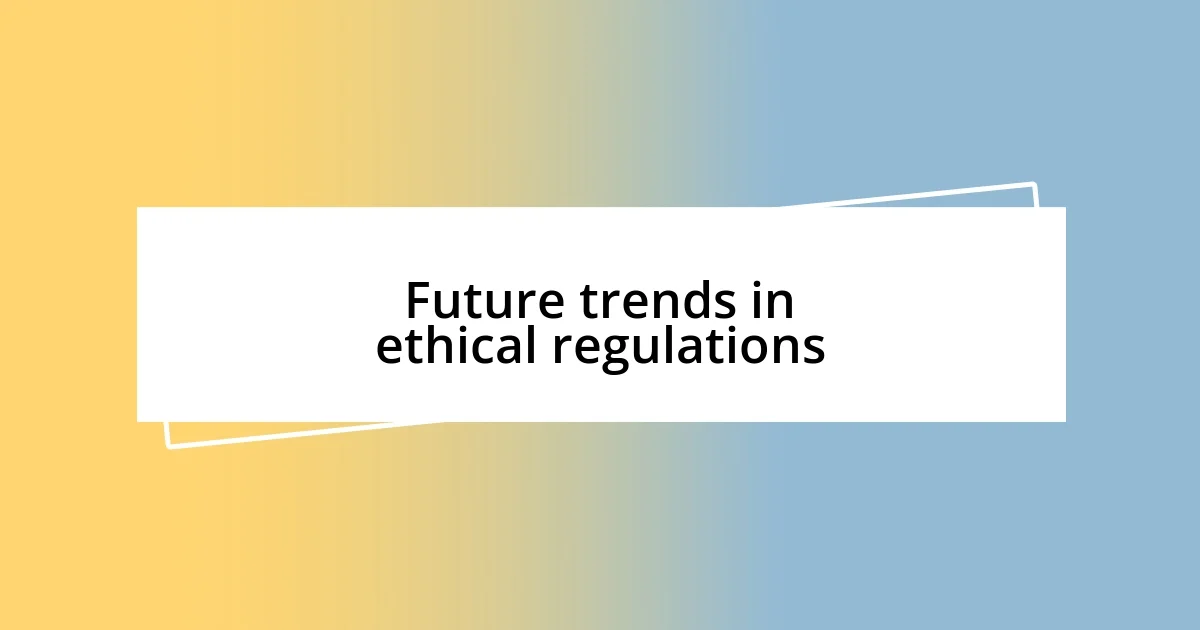
Future trends in ethical regulations
As I reflect on future trends in ethical regulations, I can’t help but notice the growing emphasis on sustainability and social responsibility. More organizations are realizing that ethical conduct isn’t just about compliance; it’s about making a positive impact on society and the environment. Have you ever seen a company actively promote its sustainability initiatives? I was genuinely impressed when a local business integrated eco-friendly practices into its operations, showcasing a commitment to ethical standards beyond mere regulation.
Another trend I find particularly intriguing is the role of artificial intelligence in promoting ethical compliance. As technology continues to evolve, AI tools can assist organizations in identifying potential ethical breaches before they escalate. I recently read about a firm that employed AI to analyze communication patterns for compliance risks. It sparked my curiosity—can we really rely on technology to uphold ethics? Though it sounds promising, I remain cautious about how we must balance these tools with human judgment.
Lastly, I believe transparency will take center stage in future ethical regulations. Recently, I’ve encountered several organizations adopting open-book management, inviting employees to understand financials and decision-making processes. It made me ponder—how can transparency cultivate a culture of accountability? I’ve personally felt more engaged when I know how my input impacts the organization’s direction. This shift towards openness could revolutionize workplace ethics, encouraging a sense of ownership and responsibility among all team members.




